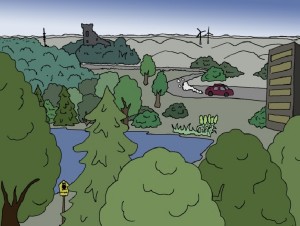Sustainable Forest Resource Economics
The department Sustainable Forest Resource Economics adopts an ecological-economic and institutional perspective on the assessment, valuation and coordination of forest resources uses. A sustainable that is an ecological and social-oriented integration of forest ecosystems functions and services into economic and political decision-making incorporates more than the monetary valuation of forest goods and services.
Forests provide a range of goods and services, but only some wood and non-wood products are traded on markets that generate income for the forestry sector. However, most forest services have the character of public goods and common-pool resources; their lack of market value often leads to their under provisioning and/or under valuation in political and economic decision-making.

Our central focus is that bundles of forest ecosystem services and the benefits they provide to society need to be thematised, and the options for their sustainable provisioning elaborated with the help of novel incentive-based policies, private sector payments, and governance strategies to internalise the value of forest ecosystem services. The risks, opportunities and challenges have to be carefully assessed as a basis for the multifunctional use of forests.
Guiding our teaching and research activities is the understanding that searching for tradeoffs and balancing heterogeneous societal interests cannot be coordinated by markets alone as they need to be embedded as part of broader governance strategies. Governance consists of state regulations, market mechanisms and actor networks as sets of formal and informal rules in different combinations.
Sustainable forest resource economics is understood as a way of thinking about and experimenting with governance alternatives that consider the biophysical conditions, forest management systems and institutions in various combinations for societal transformation towards sustainable development. Forming its basis is a system-based ecological-economic understanding that respects ecological boundaries and considers the range of concerned actorsŌĆÖ positions and demands.
Therefore, the chair of sustainable resource economics is strongly interdisciplinary in nature - seeking an open and constructive exchange that crosses sectoral and disciplinary boundaries.










